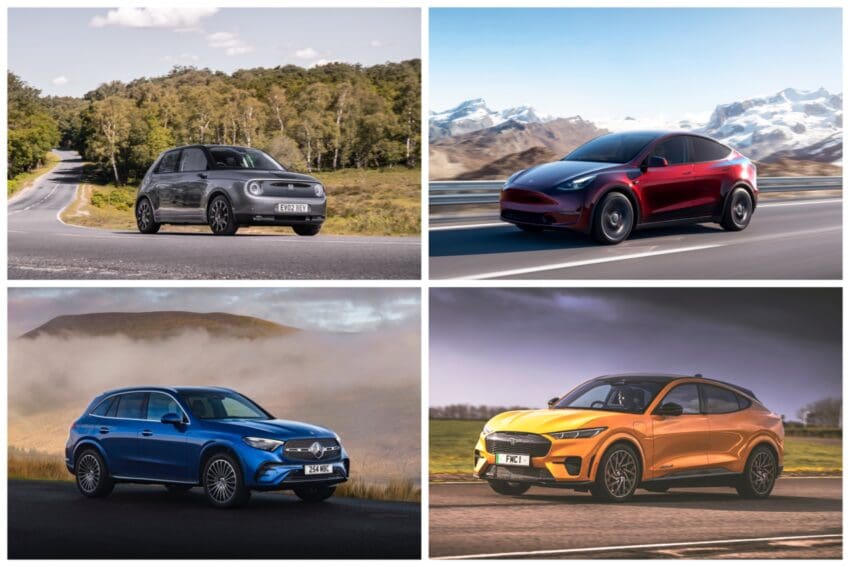
Revealed: The best and worst EV depreciation, from BMW to Tesla
A new study has identified the electric cars which lose their value the slowest as well as those hit with the highest depreciation.
Recent years have seen volatility in secondhand EV values, with prices for some models yo-yoing dramatically and some cars losing value rapidly while others hold their prices well.
As the wider used car market steadies after a tumultuous few years and the EV market matures, values are settling down, but there are still significant differences. Now, new research has identified the models with the best resale values and those that suffer the worst depreciation.
Analysing data for almost 70 all-electric models, the Electric Car Scheme identified the Mercedes-Benz EQC as the best for retaining its value, losing an average of just 6% of its value each year.
According to the salary sacrifice experts’ analysis, the now-discontinued premium SUV sheds value at around half the average rate for an EV. Based on its calculations, the average EV loses just under 13% of its value per year.
Just behind the Mercedes was the quirky Honda e. The stylish city car was never a big seller when new but its cute charm appears to have helped slow depreciation, with an average decline of 6.57% per year.
The Volkswagen E-Golf performs similarly well, with average depreciation of 6.92%, while the BYD Dolphin is the only car still on sale to make it into the top five, just ahead of the Smart ForFour.
The 10 electric vehicles that maintain their value best
| Model | Years of Manufacture | Expected yearly drop in value |
| Mercedes-Benz EQC | 2019-23 | 5.99% |
| Honda E | 2020-22 | 6.57% |
| Volkswagen e-Golf | 2018-20 | 6.92% |
| BYD Dolphin | 2023- | 7.24% |
| Smart forfour | 2020-22 | 7.32% |
| BYD Seal | 2023- | 7.52% |
| Lotus Eletre | 2023- | 8.85% |
| Lexus RZ | 2023- | 9.47% |
| BMW i5 | 2023- | 9.48% |
Fastest depreciating EVs
Unsurprisingly, EVs which have proved popular on the new market tend to lose their value faster thanks to wider availability on the secondhand scene. That could help explain why the Tesla Model Y topped the table for highest depreciation. The data suggests the world’s best-selling EV loses an average of 18.54% per year.
Just behind it the popular Hyundai Ioniq 5, which helped cement Hyundai’s reputation as an EV expert, loses an average of 18.52% annually.
All of the five EVs with the worst depreciation lose more than 17% value per year, with the BMW iX, Kia Soul and MG 5 all also suffering higher than average depreciation.
The study took used car information from Autotrader for models with at least three years’ of data and used an exponential decay data model to work out average value loss per year.
The 10 electric vehicles that maintain their value worst
| Model | Years of Manufacture | Expected yearly drop in value |
| Tesla Model Y | 2022- | 18.54% |
| Hyundai Ioniq 5 | 2021- | 18.52% |
| BMW iX | 2021- | 17.34% |
| Kia Soul | 2017- | 17.30% |
| MG MG5 | 2020-24 | 17.09% |
| Fiat 500e | 2021- | 17.02% |
| Mercedes-Benz EQS | 2022- | 16.68% |
| Hyundai Ioniq 6 | 2023- | 16.63% |
| Skoda Enyaq | 2021- | 16.56% |
| Ford Mustang Mach-E | 2021- | 16.02% |
Speaking on the findings, Thom Groot, CEO and co-founder of The Electric Car Scheme, said: “With the UK continuing to push for low-emission transport and more drivers switching to EVs, it’s never been more important to understand how different models hold their value over time.
“Depreciation plays a major role in the total cost of ownership, especially for company car drivers or those using salary sacrifice schemes, where long-term value translates into either savings or unexpected costs.
“It’s interesting that many of the best and worst-performing models for value retention are still in production. It shows just how much EV quality, desirability, and long-term appeal can vary, even among models manufactured in the same period. It’s a timely reminder that not all EVs are created equal, and that careful research is needed to benefit in the long run.”
It’s worth noting that, like any car, EVs depreciate fastest in the first three years of ownership. Recent research by We Buy Any Car suggests they could lose as much as 40% in the first year before the decline smooths out.
That’s bad news for the original owners but means buyers can snap up nearly new EVs at a significant discount if they choose carefully.